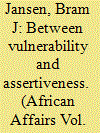|
|
|
Sort Order |
|
|
|
Items / Page
|
|
|
|
|
|
|
| Srl | Item |
| 1 |
ID:
085986


|
|
|
|
|
| Publication |
2008.
|
| Summary/Abstract |
This article provides a study of the African National Congress (ANC) local organization at party branch level. It focuses on the branches' community activities, on their participation in party structures, and on the ANC political culture. It takes an organizational perspective on the study of political parties and refers to the mass party model. The ANC has a strong tradition of mass organization, and the ANC formal organization conforms to the mass party ideal-type: branches are meant to be active agents on the ground, while the party leadership is supposed to implement the membership's decisions. The ANC has developed a certain type of mass political culture, of popular politics. The article also shows how bottom-up decision-making processes concretely provide a certain level of influence to the members over the selection of leadership and the party's policies (even if through intermediary brokers). This article is a contribution to the renewed academic debates on African political parties and takes the stand that organizational and empirical approaches should be a priority.
|
|
|
|
|
|
|
|
|
|
|
|
|
|
|
|
| 2 |
ID:
085984


|
|
|
|
|
| Publication |
2008.
|
| Summary/Abstract |
Resettlement to third countries is regarded as a durable solution to refugee crises. In Kakuma refugee camp in north-west Kenya, seeking a better life in industrialized countries has become a preoccupation for many refugees. In this article the effects of the practice of third country resettlement on the camp population are explored. Increased ease of communication with the diaspora, expanded knowledge of entitlements, and the high visibility of resettlement processing within the camp have increased the demand for resettlement. The article argues that the result is an environment that encourages refugees to cheat through claiming insecurity and negotiating vulnerability. Refugees come to believe that resettlement is something that can be actively achieved, rather than a benefit extended only to the genuinely vulnerable
|
|
|
|
|
|
|
|
|
|
|
|
|
|
|
|
| 3 |
ID:
085991


|
|
|
|
|
| Publication |
2008.
|
| Summary/Abstract |
Between 22 April and 6 May 2008, Sudan's fifth population and housing census was conducted in both North and South Sudan. Because it will have a decisive impact on future power and wealth sharing in Sudan, the census has been highly contested, and its outcome is likely to be controversial. Will the census enhance future stability in the Sudan? Or will it turn out to be a stumbling block and cause for further conflicts?
This briefing argues that the hotly contested census not only highlighted existing tensions between the North and the South on topics such as resources, power sharing, and identity but also intensified competition among Southern Sudanese political actors. The census, an immense logistical undertaking, mobilized the major political actors who seek to use it instrumentally in their own interest. It also created high expectations among the population about the future provision of services and development.
Under the provisions of the 2005 Comprehensive Peace Agreement (CPA) signed between the Sudan People's Liberation Movement/Sudan People's Liberation Army (SPLM/A) of Southern Sudan and the (Northern) National Congress Party (NCP), the census is supposed to pave the way for the planned 2009 general elections as well as the referendum in 2011 in which Southerners will decide about independence from the rest of Sudan.
In 2005, after 21 years of war between the North and the South, the two main parties in the conflict - the SPLM/A and NCP - signed the CPA, which ended armed hostilities. The vision of then SPLM/A rebel leader John Garang, who died in a helicopter crash a few months after the signing, was not an independent South, but a united 'New Sudan'. In terms of the CPA's power-sharing agreement, the SPLM, the political wing of the SPLA, became a partner of the NCP at the national level in the Government of National Unity (GoNU). In the South, the SPLM dominates the autonomous Government of Southern Sudan (GoSS), which was established with independent executive, legislative, and judiciary bodies based on the CPA.
|
|
|
|
|
|
|
|
|
|
|
|
|
|
|
|
| 4 |
ID:
085980


|
|
|
|
|
| Publication |
2008.
|
| Summary/Abstract |
The 2007 general elections in Sierra Leone marked a decisive moment in the country's post-war recovery. In this article we show how political parties strategically remobilized ex-combatants into 'security squads' in order both to protect themselves and to mobilize votes. We look at the tactical and strategic motives behind ex-combatants' choice to join the political campaigning and the alternatives (such as 'watermelon politics'), and we also examine the deep distrust between politicians and ex-combatants. Focusing on politics as the domestication of violence, we shed light on the continuation of pre-war and war-time mobilization of youth into politics and demonstrate how electoral moments can legitimize violence. In hindsight, the 2007 elections strengthened the democratic process in Sierra Leone, but this article shows on what fragile ground this success was built.
|
|
|
|
|
|
|
|
|
|
|
|
|
|
|
|
|
|
|
|
|